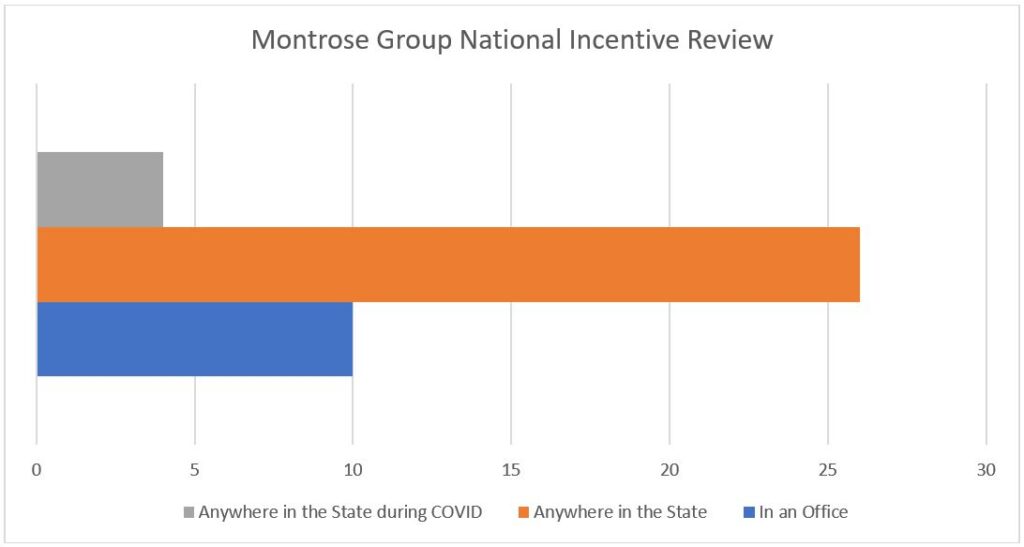JP Morgan Chase’s announcement that is plans substantial reductions in its office space— needing just 60 seats per 100 people— illustrates the wholesale change the office market can expect because of the growth of remote work. Work From Home is likely not just to be a reaction to COVID 19 but many workers and companies have adapted well to this new workplace model and are likely to shift more workers to this model in whole or part. Remote work will have a dramatic impact on corporate site location projects. Companies in key corporate headquarters, professional service firms, back office, advanced services such as financial services and technology companies are likely to enter corporate site location strategies with less of a focus of creating high-wage jobs all located in a geographic region.
The spreading out of office workers to different locations creates a nightmare for the negotiations and operations of many economic development incentive programs at the local and state government levels. States with a reliance on property tax in particular are very hesitant to give up incentive requirements that mandate large capital investments as part of a corporate site location deal. This works well for a factory, fulfillment or data center but high-wage office jobs may well not need a desk and office for every worker associated with the facility.

The Montrose Group conducted a fifty state review of local and state economic development incentive programs that included interviews with dozens of local and state economic development officials. The good news for remote work and economic development incentives is that the majority of states are prepared to provide economic development incentives to a project producing high-wage jobs anywhere in the state. These programs may still have a capital investment requirement but many of these states count rent or building construction costs which very quickly can meet these capital investment requirements. Unfortunately, 4 states are only offering temporary relief for companies to not have workers in an office if they want to count them for economic development incentives and 10 states have not even provide relief to COVID 19 impacted companies nor have they changed their economic development incentive programs to retain and attract high-wage jobs if these jobs will not be located in a specific location.
Companies considering a remote working model should encourage states to adopt changes to their economic development incentives similar to what Ohio or Texas has to offer. The Ohio Job Creation Tax Credit is the state’s main economic development tax credit program. The Ohio Job Creation Tax Credit program, for incentives approved after 9/29/17, permits businesses to include “qualifying work-from-home employees” which is defined as an employee who is a resident of this state and whose services are supervised from the employer’s project location and performed primarily from a residence of the employee located in this state that is an Ohio resident and the employer must have an actual project location in Ohio from which the work-from-home employee is supervised. States like Texas and others that utilize “deal close fund” such as the Texas Enterprise Fund generally have substantial flexibility as to how they count employees for an incentive program. Some cities are ahead of the curve on the remote working trend. Rather than focus just on the taxes they will lose, cities like Tulsa, Oklahoma and Natchez, Mississippi are actively recruiting remote workers. Tulsa Remote is a program that offers eligible participants $10,000 to live in Tulsa and work remotely. The Mississippi River town of Natchez, Mississippi is offering $6000 to eligible participants to move to their community and work remotely through their Shift South Strategy. Communities across the United States are developing economic development strategies to capitalize on the remote working trend that is likely to continue at some levels after COVID 19 dies off. Unfortunately, large states such as Arizona, Illinois, South Carolina and others are failing the test for retaining and attracting high-wage jobs that will not be located in an office through their economic development incentive programs.
Remote work is here to stay. The question is whether communities will be positioned to capture this high-wage job growth.